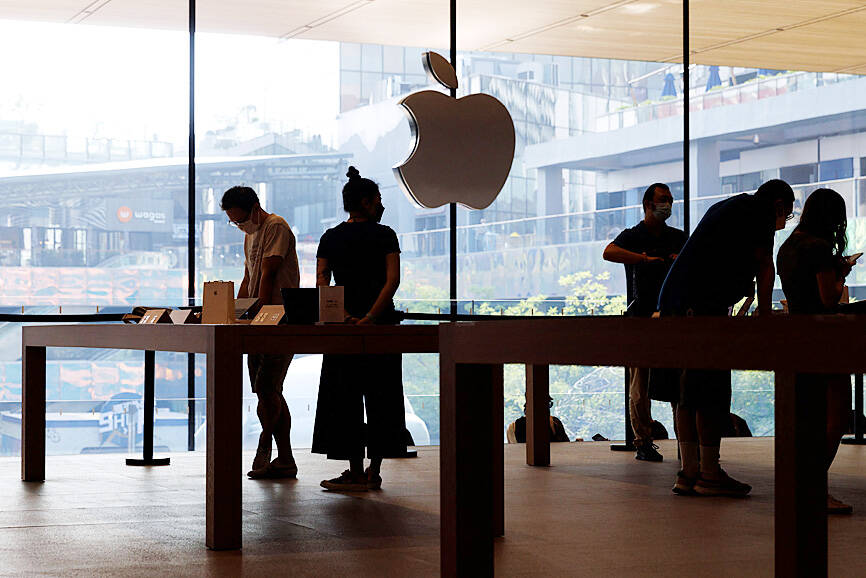India and Vietnam are emerging as Apple Inc’s next manufacturing hubs as assembly partners seek to add resilience to a supply chain heavily centered on China and shaken by its geopolitical and health challenges.
Key electronics manufacturers are moving faster to diversify their capacity globally, taking advantage of local incentive policies, Counterpoint Research analysts Ivan Lam (林科宇) and Bai Shenghao (白晟昊) said.
The multiyear effort, which began before COVID-19 and the economically stifling lockdowns that roiled China, could see leading partner Hon Hai Precision Industry Co (鴻海精密) move as much as 30 percent of its capacity to those Asian nations and Brazil, the analysts said.

Photo: Reuters
They said that a direct replacement for China is not immediately in sight, but firms such as Hon Hai — known internationally as Foxconn Technology Group (富士康科技集團) — and fellow Taiwanese assembler Pegatron Corp (和碩) are putting the foundations in place to handle more of the final assembly and packaging of products outside China.
“Led by Foxconn and Pegatron, companies have already invested in factories, production lines, relatively advanced manufacturing processes, and personnel training in India,” they wrote.
India’s vast population and high birth rate make it an attractive market for end-products as well as a manufacturing base, while Vietnam has lower labor costs than in China. Vietnam has attracted 21 Apple suppliers to operate in the country, the report said.
However, it does lack the ability to produce the all-important iPhone handset.
Smartphones manufactured in India grew 16 percent in the second quarter of this year, reaching more than 44 million units, Counterpoint’s research found.
For its part, China has seen its workforce shrink since 2020, World Bank data showed.
A legion of skilled workers who received some education and training has been the backbone of China’s rise as the world’s factory.
Apple has done its part to reduce reliance on individual factories or skilled labor by making its iPhone product design more modular and transferable across facilities, Counterpoint said.
The company has focused on ease of maintenance and deployment of new product assembly.
Manufacturing difficulty was reduced significantly with the iPhone 14 and iPhone 14 Plus models, Lam and Bai said.
“Now it is possible for the plants in India to produce the iPhone 14 almost simultaneously with the plants in China,” the analysts wrote.
Apple began iPhone production in India much faster this year than with prior generations.

MULTIFACETED: A task force has analyzed possible scenarios and created responses to assist domestic industries in dealing with US tariffs, the economics minister said The Executive Yuan is tomorrow to announce countermeasures to US President Donald Trump’s planned reciprocal tariffs, although the details of the plan would not be made public until Monday next week, Minister of Economic Affairs J.W. Kuo (郭智輝) said yesterday. The Cabinet established an economic and trade task force in November last year to deal with US trade and tariff related issues, Kuo told reporters outside the legislature in Taipei. The task force has been analyzing and evaluating all kinds of scenarios to identify suitable responses and determine how best to assist domestic industries in managing the effects of Trump’s tariffs, he

TIGHT-LIPPED: UMC said it had no merger plans at the moment, after Nikkei Asia reported that the firm and GlobalFoundries were considering restarting merger talks United Microelectronics Corp (UMC, 聯電), the world’s No. 4 contract chipmaker, yesterday launched a new US$5 billion 12-inch chip factory in Singapore as part of its latest effort to diversify its manufacturing footprint amid growing geopolitical risks. The new factory, adjacent to UMC’s existing Singapore fab in the Pasir Res Wafer Fab Park, is scheduled to enter volume production next year, utilizing mature 22-nanometer and 28-nanometer process technologies, UMC said in a statement. The company plans to invest US$5 billion during the first phase of the new fab, which would have an installed capacity of 30,000 12-inch wafers per month, it said. The

Taiwan’s official purchasing managers’ index (PMI) last month rose 0.2 percentage points to 54.2, in a second consecutive month of expansion, thanks to front-loading demand intended to avoid potential US tariff hikes, the Chung-Hua Institution for Economic Research (CIER, 中華經濟研究院) said yesterday. While short-term demand appeared robust, uncertainties rose due to US President Donald Trump’s unpredictable trade policy, CIER president Lien Hsien-ming (連賢明) told a news conference in Taipei. Taiwan’s economy this year would be characterized by high-level fluctuations and the volatility would be wilder than most expect, Lien said Demand for electronics, particularly semiconductors, continues to benefit from US technology giants’ effort

‘SWASTICAR’: Tesla CEO Elon Musk’s close association with Donald Trump has prompted opponents to brand him a ‘Nazi’ and resulted in a dramatic drop in sales Demonstrators descended on Tesla Inc dealerships across the US, and in Europe and Canada on Saturday to protest company chief Elon Musk, who has amassed extraordinary power as a top adviser to US President Donald Trump. Waving signs with messages such as “Musk is stealing our money” and “Reclaim our country,” the protests largely took place peacefully following fiery episodes of vandalism on Tesla vehicles, dealerships and other facilities in recent weeks that US officials have denounced as terrorism. Hundreds rallied on Saturday outside the Tesla dealership in Manhattan. Some blasted Musk, the world’s richest man, while others demanded the shuttering of his